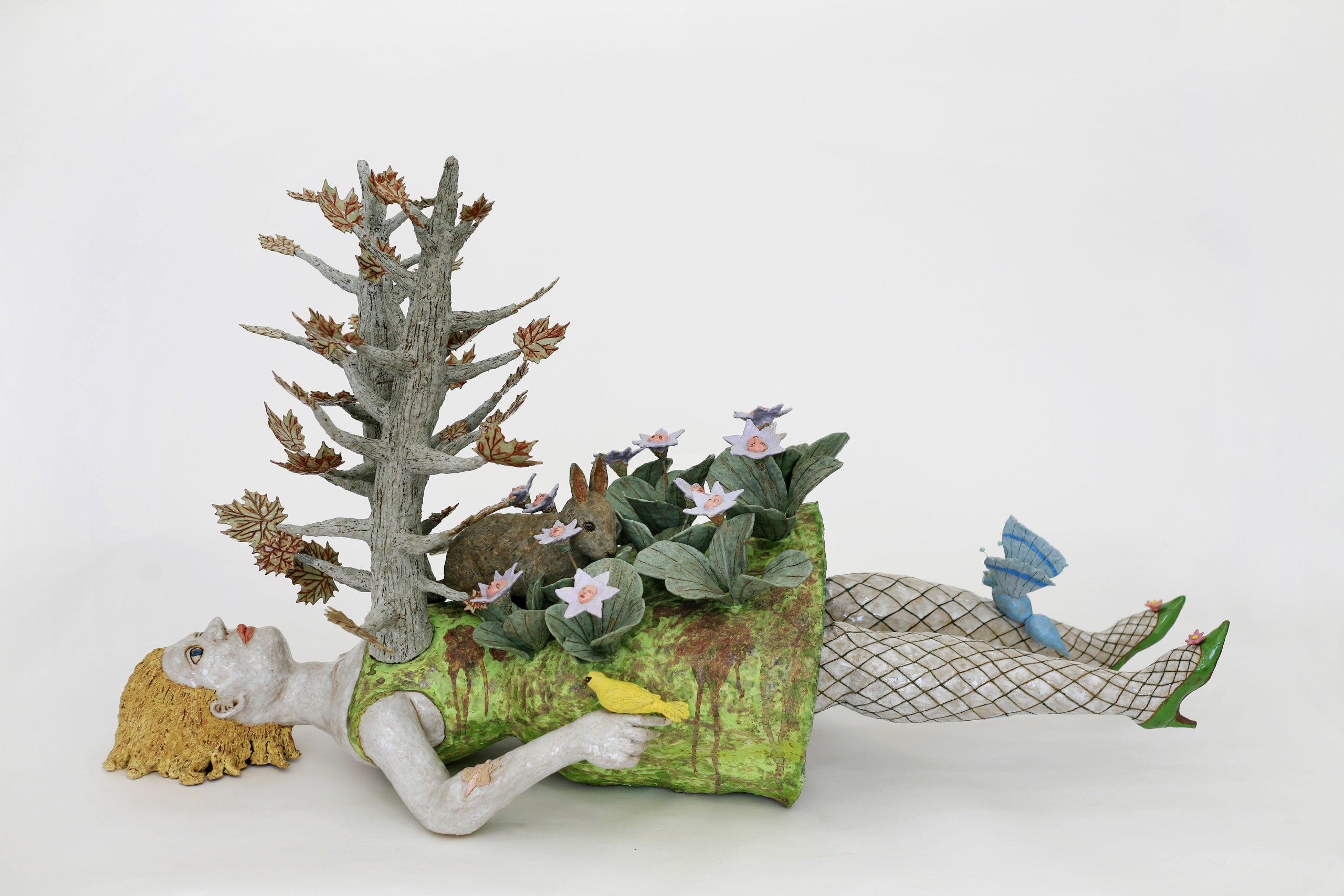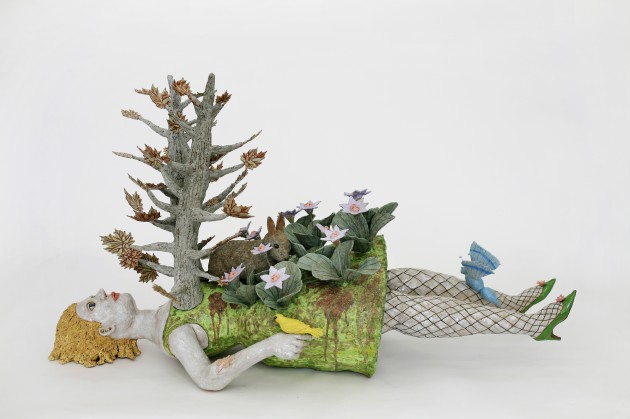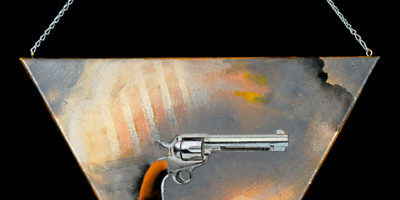
Plotless
At the age of 37, I purchased two small parcels of land. I had immediate use for the one; there was no choice. But the other — a similar rectangle of flattened blades of grass — awaits me. Or so I thought.
Years earlier, long before I’d contemplated tiny pieces of real estate, I had married a young man who had made it his mission to make me feel safe. Barry was not like any of the other Jewish guys I’d ever met. He was burly and always dressed in the buttoned-down, blue shirt issued by the gas station where he worked to support his parents. Had it been 20 years later and had he not been afraid of needles, he would have sported a tattoo. For our honeymoon, we took a camping trip to Acadia National Forest in Maine. One night I woke up screaming. Our tent had collapsed on top of me and I was pinned to the ground. Barry thought it was a bear attack and in a frenzy of adrenaline and muscle he unpinned me and ripped a hole in the tent. It was a tree bough. We were unscathed, mostly, and thrilled. The National Park system owed us a new tent.
We went on to have an ordinary life and an ordinary marriage: we fought about things like his poker night, who should wash the dishes, and whether it was best to have an odd or even number of children. We decided upon three, took the kids camping in the state forest that offered the kind of nature programs where you get a badge if you finish the hike. We packed a lot of pony rides and playgrounds and beach vacations into just a few years. Mostly, I drove carpools, kept my kids flush with penicillin, and looked for a way to make a law practice fit into my life. Sometimes Barry and I got away, just the two of us. On a getaway to Bermuda, Barry developed a weird cough and night sweats. Even more disturbing, he lost his lucky pirate-coin necklace in the ocean. We figured the cough and night sweats were run-of-the-mill, like bronchitis. When his doctor called and said Barry needed tests immediately, we didn’t panic. Barry was only 33. Doctors can be so dramatic.
On the day Barry died, five years later, of non-Hodgkins’ lymphoma, my M.D. neighbor sent over Valium and a tray of cold cuts. The funeral director sat in our family room and asked many helpful questions to guide me through the process. I answered “yes,” I answered “no.” I ordered folding chairs for shiva.
Barry’s Orthodox upbringing gave him a healthy disrespect for sanctimony and kosher food, but he was a man of no pretense and so the Jewish traditions of burial, I thought, fit him just fine. I had his body wrapped in a shroud, no restrictive clothing. The coffin and nails were wood. Everything would disintegrate. Ashes and dust.
The man from the funeral home had a respectful, if disembodied, manner. When he asked me, “One plot or two?” he paused for a moment, then shrugged his shoulders. “You can buy two and always sell one later.” I didn’t think about it long: Jewish funerals happen so quickly. I purchased the real estate and moved on.
It has been nearly 20 years since that purchase, and I was right. Barry’s cemetery row filled up and it’s good we got the second spot. But something else caught me by surprise: before the passage of a respectable amount of time, I fell in love. By all standards, Joe was the wrong guy. He had two little kids, was nine years younger than I, and had been raised Catholic. But we both had had plenty of heartbreak and we still had plenty of energy. The second time we met he was reading Maimonides.
When I considered remarriage, my rabbi had some advice: “Your new husband will need to love Barry as well as you.”
Joe has done this, and more. He has loved my children, and he asks everyone who knew Barry what they loved about him. When he steps into a difficult situation, he assesses what is necessary, then does the right thing. He has even promised I could die first. It’s our running joke, since he’s so much younger, and it’s our way of dealing with the inevitable. Despite our happiness, we’ve had a real estate problem since the get-go: Where will Joe be buried? The spaces on both sides of my burial plot are already taken.
According to my rabbi, Jews do not say “till death do you part” at their wedding ceremony. Barry died, I married Joe, and there is a blurry line between my first marriage and my second. Barry and Joe have a relationship, too. There’s no blood connecting them, but they’re linked through me. Now Joe and I have been together so long that the seesaw is about to tip: Soon I will have been married longer to my second husband than I was to my first.
I wish I knew the right thing to do. For a while, we considered buying another plot just across the road. Whoever ended up there would be within spitting distance of the other two. Close, but still set aside. Or we could buy two new plots. I don’t want to arrange for my body to be laid next to Joe’s, because I worry about not being next to Barry. Nor do I want to leave the plot I already purchased unfilled, because that feels wrong, too.
For Joe and me, the question of plot has become an irresolvable marital dispute, so we’ve pushed it, as it were, underground. Much of what happens in life is inexplicable; or worse, stupid. We know the beginning, we know the end, but everything in between zigs and zags with no real regard for how we expected things to be. These two little bits of real estate practically in the middle of the country, one with a headstone, the other graniteless, are as permanent and reliable as people and marriages are not.
When my kids were little, they used to make a game of finding the largest rock to place on their father’s headstone, which was etched with his name, dates of birth and death, and the words HUSBAND and FATHER. Presumably they’ll place rocks on my gravestone, too, after I’m gone, and on Joe’s after he dies.
The last time I went to visit Barry’s grave, I went with our youngest child, Adam. Adam is the kind of person you want to have around if you’re about to pass out on hard concrete after a race, or fall through a glass window at a party. He is decisive and he jumps to the rescue without hesitation.
Adam has pursued a career in real estate so he has insights in matters pertaining to land. He can ask the tough questions. Who is the empty grave for? Where will Dad (Joe) be buried?
“It’s a big problem,” I said.
I like to think Adam inherited his pragmatism from me, not from either of his fathers. But what he suggested made me wonder: “Maybe I’ll be buried here,” he said.
“Don’t say such a thing,” I gasped. I can’t bear the idea of my son dying before me.
“Why?” Adam answered, calm and inquisitive.
“Because that means you would die before me.”
“No,” he said, smiling slyly. “You have no idea where I plan to bury you.”
I looked appreciatively at my young man, my child, and the jokey, unflappable way he has learned to negotiate the sometimes painful world, even from the vantage point of the blue granite marker of his father’s grave and the indefinitely empty plot of land where we both stood, feet firmly planted.
Lori Wald Compton’s fiction and non-fiction have been published in both literary and popular media. She devotedly tutors Cleveland public school students in reading competence, and shares her meditation journey at slowbreathsoftheart.com.
Related stories from the Lilith archives:
Read “Bob and Arline and Norm and Alyce” and more!



